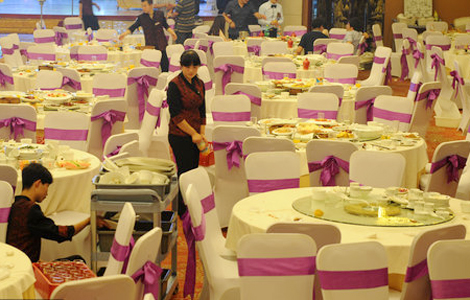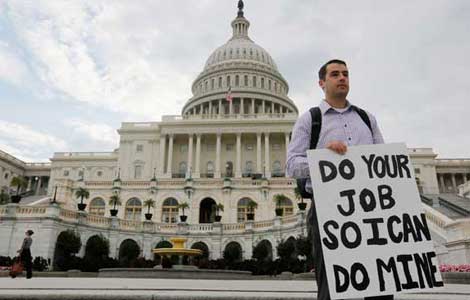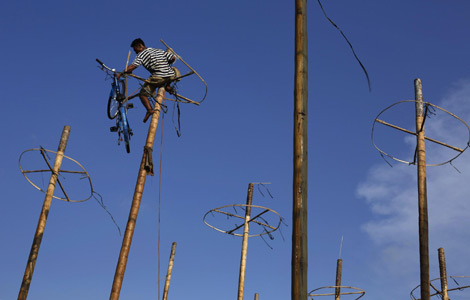UNSC urges boost to Syria aid access
Updated: 2013-10-03 02:01
(Xinhua)
|
||||||||
UNITED NATIONS - Building on a fragile unity, the UN Security Council on Wednesday urged the Syrian government to allow cross-border aid deliveries and called on all parties to Syria's conflict to agree on humanitarian pauses in fighting and key routes for aid convoys.
More than 2 million Syrians, mostly women and children, have fled during the 2-1/2-year-old civil war, which the United Nations says has killed more than 100,000 people. Millions more inside Syria are in desperate need of help, but aid has slowed to a trickle because of violence and excessive red tape.
The 15-member Security Council agreed to a non-binding statement in a bid to boost aid access, drafted by Australia and Luxembourg, after overcoming a long diplomatic deadlock on Friday between Russia and Western powers to pass a resolution to rid Syria of chemical weapons.
UN aid chief Valerie Amos said that if the statement's requests on aid access were implemented fully then humanitarian groups could help some 2 million people in Syria who have for many months been unreachable.
"Our task now is to turn these strong words into meaningful action for the children, women and men who continue to be the victims of the brutality and violence," Amos told reporters.
Syrian UN Ambassador Bashar Ja'afari said the Syrian government would study the council statement before responding.
The statement urges Syrian President Bashar al-Assad's authorities to "take immediate steps to facilitate the expansion of humanitarian relief operations, and lift bureaucratic impediments and other obstacles."
This includes "promptly facilitating safe and unhindered humanitarian access to people in need, through the most effective ways, including across conflict lines and, where appropriate, across borders from neighboring countries."
The statement was based on a wish list that Amos sent the council last month. Amos has said some cross-border aid deliveries were already being made from Lebanon.
Only 12 international aid groups are approved by the Syrian government to work in the country and convoys of aid trucks struggle to meet demand, delayed by having to negotiate dozens of government and opposition checkpoints, UN officials say.
A senior council diplomat, speaking on the condition of anonymity, said that while the statement was unlikely to make a huge difference to aid access instantly, if it "helps to get a bit more aid through than that will be well worth having."
"I hope it will strengthen the ability of Valerie Amos and the humanitarian agencies to break through a lot of the bureaucratic hurdles they have been facing in Damascus and it puts the full weight of the Security Council behind her demands," he said.
Humanitarian pause in fighting
The agreed statement also urges all parties to "immediately demilitarize medical facilities, schools and water stations, refrain from targeting civilian objects, and agree on the modalities to implement humanitarian pauses, as well as key routes to enable promptly ... the safe and unhindered passage of humanitarian convoys."
The council has for months been discussing how to respond to the Syrian aid crisis. Western members recently decided to pursue a statement on the issue rather than a resolution to avoid a likely showdown with Russia and China, diplomats said.
"The need here was speed," Australian U.N. Ambassador Gary Quinlan told reporters. "We all know that resolutions take a while to negotiate because they are legally binding ... It is possible for a statement to become a resolution over time."
Amos said she would continue to press the Security Council for a resolution on aid access in Syria.
Russia, a close ally of Syrian President Bashar al-Assad, and China have vetoed three Security Council resolutions since October 2011 that would have condemned Assad's government and threatened it with sanctions.
Some diplomats had warned that Russia would be wary of backing a call for cross-border aid access because Assad's government is opposed to such a move over concerns that weapons could be smuggled more easily to opposition forces.
But another senior U.N. diplomat, speaking on condition of anonymity, said Moscow agreed to the statement because it simply "urges" the Syrian government to allow aid deliveries across borders from neighboring countries rather than "demands."
Europe's aid chief, Kristalina Georgieva, last week welcomed the prospect of a council statement, but added: "We are not giving up on the Security Council at some point coming up with a binding resolution on humanitarian access."
Georgieva said that during September $1 billion had been pledged by countries for Syrian aid relief.
The Security Council asks U.N. Secretary-General Ban Ki-moon to regularly inform it of progress on implementation of the steps outlined in the aid statement. Ban also plans to convene an aid conference on Syria in January, diplomats said.

 Diplomatic game
Diplomatic game
 Xi pledges to boost ties with Indonesia
Xi pledges to boost ties with Indonesia
 The first place to be called the 'Middle Kingdom'
The first place to be called the 'Middle Kingdom'
 Lavish wedding ebbs under luxury ban
Lavish wedding ebbs under luxury ban
 Travel becomes passport to a new look
Travel becomes passport to a new look
 Impasse in Congress shuts down services
Impasse in Congress shuts down services
 Li, Serena cruise on, Venus out at China Open
Li, Serena cruise on, Venus out at China Open
 Portrait of an amateur Waltz dancer
Portrait of an amateur Waltz dancer
Most Viewed
Editor's Picks

|

|

|

|

|

|
Today's Top News
Obama to meet with congressional leaders
Xi to address Indonesia's parliament
Russian embassy in Tripoli attacked
Iran has proposal for nuclear deal
The luxury of travel
US novelist Tom Clancy dies at 66
China, Indonesia renew currency swap deal
Obama cuts short Asia trip
US Weekly

|

|






